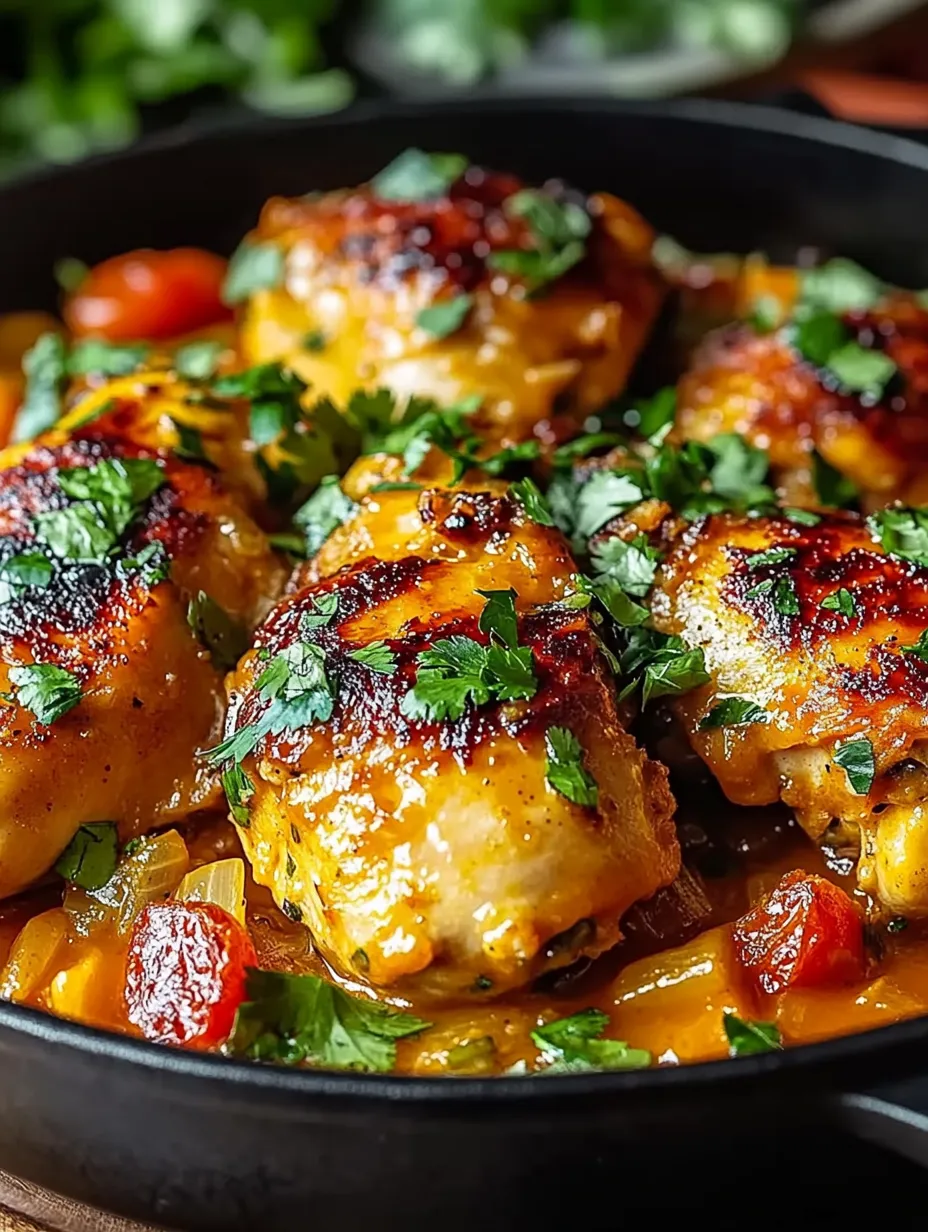 Pin it
Pin it
Spicy Brazilian Coconut Chicken combines tender chunks of chicken with a velvety coconut sauce that delivers just the right amount of heat. This vibrant dish strikes the perfect balance between creamy and light, with the coconut milk providing richness without weighing down the bright flavors of the peppers and spices. The colorful peppers add both visual appeal and a sweet contrast to the warming spices, making each bite a complex interplay of flavors that dance across your palate.
I made this dish last weekend when my sister visited from out of town. She's usually pretty picky about spicy food, but she couldn't stop raving about the flavor balance. The coconut milk tames the heat just enough while still letting those warming spices shine through.
Ingredients
- Boneless, skinless chicken thighs: Their natural richness and tenderness make them ideal for this dish. They won't dry out during cooking and absorb flavors beautifully. If you prefer white meat, chicken breasts will work too, just be careful not to overcook them.
- Olive oil: Provides the base for sautéing with a mild flavor that doesn't compete with the dish's spices. Use a good quality olive oil, but save your extra virgin for finishing other dishes.
- Onion: Creates the aromatic foundation of the sauce. Sweet onions work particularly well here, melting into the sauce as they cook and adding natural sweetness that balances the spice.
- Garlic: Adds essential depth and pungency. Fresh garlic is strongly preferred over pre-minced for its brighter, more complex flavor profile.
- Bell peppers: The red and yellow varieties not only add gorgeous color but also a subtle sweetness. Their texture provides pleasant contrast to the tender chicken and creamy sauce.
- Coconut milk: The heart of the sauce, providing silky richness. Full-fat delivers the best texture, but light coconut milk can be substituted if preferred.
- Diced tomatoes: Add acidity and body to the sauce. Draining them prevents the sauce from becoming too watery while still capturing their flavor.
- Tomato paste: Concentrates the tomato flavor and helps thicken the sauce. That small amount makes a big difference in creating depth.
- Cumin, coriander, paprika: This spice blend creates the distinctive warming flavor profile that's essential to the dish. Toasting these spices awakens their essential oils for maximum impact.
- Cayenne pepper: Provides the controllable heat element. Adjust the amount up or down depending on your spice preference without compromising the overall flavor.
- Fresh cilantro: Brightens the finished dish with its distinctive herbal notes. If you're not a cilantro fan, fresh basil or parsley can be substituted.
- Lime wedges: The final acidic touch that cuts through the richness and brings all the flavors into focus. Don't skip this essential finishing element.
 Pin it
Pin it
Step-by-Step Instructions
- Step 1:
- Properly prepare the chicken - Begin by patting the chicken pieces dry with paper towels - this ensures better browning. Cut the chicken into evenly sized bite-sized pieces, about 1 to 1½ inches, so they cook uniformly. Season generously with salt and freshly ground black pepper, making sure all sides are coated. This initial seasoning layer is crucial as it provides the foundation for the dish's flavor profile. Let the seasoned chicken rest at room temperature for 10-15 minutes before cooking to take the chill off and promote even cooking.
- Step 2:
- Master the chicken browning technique - Heat a large, heavy-bottomed skillet over medium-high heat until it's properly hot - a drop of water should sizzle immediately on contact. Add the olive oil and swirl to coat the pan evenly. Carefully arrange the chicken pieces in a single layer, being careful not to overcrowd the pan (work in batches if necessary). Allow the chicken to cook undisturbed for 2-3 minutes until a golden-brown crust forms on the bottom. Then flip each piece and repeat on the other sides. The goal is not to cook the chicken through at this stage, but rather to develop flavor through browning. Once all sides are nicely seared, transfer the chicken to a clean plate and set aside.
- Step 3:
- Build the aromatic flavor base - Return the skillet to the heat and add the finely chopped onion to the oils left from cooking the chicken. Cook the onion for 3-4 minutes, stirring occasionally, until it becomes translucent and begins to soften. Use your wooden spoon to scrape up any browned bits from the bottom of the pan - these contain concentrated flavor. Add the minced garlic and cook for just 1 minute more, stirring constantly to prevent burning. Garlic burns quickly and becomes bitter, so keep a close eye on it. You'll know it's ready when the kitchen fills with its irresistible aroma.
- Step 4:
- Incorporate the peppers properly - Add both the sliced red and yellow bell peppers to the skillet with the onion and garlic. Cook for about 5 minutes, stirring occasionally, until the peppers begin to soften but still retain some crispness. This texture contrast is important for the final dish. The peppers should begin to release their natural sweetness as they cook, adding another layer of flavor complexity to the dish.
- Step 5:
- Develop depth with spices - Reduce the heat to medium and add the ground cumin, coriander, paprika, and cayenne pepper directly to the vegetable mixture. Stir continuously for 1-2 minutes to toast the spices, which releases their essential oils and intensifies their flavors. You'll know they're properly toasted when they become noticeably fragrant. Be careful not to let them burn, as this will create bitterness. Next, add the tomato paste and cook for another minute, stirring constantly to caramelize it slightly, which adds richness and umami to the final sauce.
- Step 6:
- Create the silky coconut sauce - Pour in the full can of coconut milk, stirring well to incorporate it with the spiced vegetable mixture. If your coconut milk has separated in the can, whisk it briefly before adding to ensure a smooth sauce. Add the drained diced tomatoes and stir to combine. Bring the mixture to a gentle simmer, allowing the flavors to begin melding together. Taste the sauce at this point and adjust the salt and pepper as needed. The sauce should be richly flavored even before the chicken is returned to the pan.
- Step 7:
- Complete the cooking process - Return the browned chicken pieces to the skillet, along with any accumulated juices from the plate. Gently stir to coat the chicken in the coconut sauce. Reduce the heat to maintain a gentle simmer – you want bubbles that break the surface occasionally, not a rapid boil. Cover partially with a lid and simmer for 15-20 minutes, stirring occasionally to prevent sticking. The chicken is done when it registers 165°F (74°C) on an instant-read thermometer and cuts easily with the side of a spoon. The sauce should thicken slightly but still remain pourable.
- Step 8:
- Finish with fresh elements - Once the chicken is fully cooked and tender, remove the skillet from the heat. Let it rest for 5 minutes to allow the flavors to settle and the sauce to thicken slightly more. Just before serving, sprinkle generously with freshly chopped cilantro, which adds bright, herbaceous notes that contrast beautifully with the rich sauce. Arrange lime wedges around the dish for squeezing over individual portions at the table. The fresh lime juice adds a crucial acidic element that balances the richness of the coconut milk and brings all the flavors into harmony.
The Brazilian Culinary Influence
While this dish takes inspiration from Brazilian cooking, it's a fusion creation that honors the spirit of Brazilian cuisine. Traditional Brazilian cooking often features the interplay of coconut, tomatoes, and peppers—ingredients that were embraced after being introduced through colonization and trade routes. The state of Bahia in northeastern Brazil is particularly known for its coconut-enriched dishes with African influences, where seafood or chicken is often combined with coconut milk, palm oil, and spices to create vibrant, satisfying meals.
The Magic of Coconut Milk
Coconut milk does more than just add creaminess to this dish—it acts as a flavor carrier that helps marry the various spices and ingredients. The fat in coconut milk is particularly good at dissolving fat-soluble flavor compounds from the spices, creating a more complex and harmonious sauce than would be possible with water-based liquids alone. Additionally, coconut milk has natural sweetness that balances the acidity of the tomatoes and the heat from the cayenne, resulting in a wonderfully balanced sauce.
 Pin it
Pin it
Spice Level Management
One of the beauties of this recipe is how easily the heat level can be tailored to your preference. The cayenne pepper provides a clean, bright heat that can be adjusted without compromising the overall flavor profile. If cooking for mixed preferences, consider making the base sauce milder and offering a small dish of additional cayenne or hot sauce on the side for those who enjoy more spice. Alternatively, adding a swirl of cooling yogurt or sour cream to individual servings can tame the heat while adding another layer of creaminess.
Serving Suggestions
While rice is the most traditional pairing for this dish, there are many ways to enjoy it. Nutty quinoa soaks up the sauce beautifully while adding protein and texture. For a lower-carb option, serve over cauliflower rice or with a side of roasted vegetables. Crusty artisan bread is perfect for sopping up every last drop of the delicious sauce. For a complete meal, add a simple green salad with a light vinaigrette to provide freshness and contrast to the rich main dish.
My grandmother always told me that the secret to cooking with spices is patience—letting them bloom properly before adding liquid ingredients. When I first started making this dish, I would rush this step and wonder why the flavor wasn't as deep as I wanted. Now I take my time with the spices, and the difference in the final result is remarkable.
This Spicy Brazilian Coconut Chicken has become my go-to dish when I want to impress without spending hours in the kitchen. There's something magical about the way the coconut milk melds with the spices to create a sauce that's both comforting and exciting. I love watching guests try to place exactly what makes it so special—the perfect balance of creaminess, spice, acidity, and freshness. It's a dish that feels special enough for company but simple enough for a weeknight dinner that brightens an ordinary day. Whether you're looking to expand your culinary horizons or just need a reliable crowd-pleaser, this dish delivers on all fronts.
Frequently Asked Questions
- → Can I use chicken breast instead of thighs?
- Yes, you can use either chicken breasts or thighs. Thighs tend to be more flavorful and juicy, but breasts work well too.
- → How spicy is this dish?
- With 1/2 teaspoon of cayenne, it has a moderate kick. You can adjust the amount to make it milder or spicier according to your preference.
- → Can I make this dish ahead of time?
- Yes, it actually tastes even better the next day as the flavors develop. Store in the refrigerator for up to 3 days and reheat gently.
- → Is there a substitute for coconut milk?
- For a similar creamy texture, you could use heavy cream, though the flavor will be different. For a dairy-free option, cashew cream would work.
- → What sides go well with Brazilian Coconut Chicken?
- White rice is traditional, but it also pairs well with quinoa, cauliflower rice for a low-carb option, or crusty bread to soak up the sauce.
